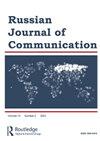大数据:对人类道德的循环或挑战:描绘俄罗斯哲学和方法论的传统
Q1 Social Sciences
引用次数: 4
摘要
如今,大数据已成为政治、经济和文化新闻的头条新闻。但大数据的本质和道德特征仍未被理解。本文提出将大数据作为永恒哲学讨论人类主体及其关键特征——传播的新领域。主要发现是俄罗斯哲学和方法论思想和经验的传统:社会和政治实践和价值观,实践哲学和决策,感觉和叙述。俄罗斯愿景的核心是人类主体在内化社会价值体系的过程中,像实际的大数据一样灵活多变。俄罗斯版的马克思主义(Vaziulin等人),俄罗斯版的逻辑和知识方法论(Bruchlinskii和Gryaznov),俄罗斯版的现象学(Shpet)和符号学(Vygotsky, Bahtin, Jacobson, Propp等人)为我们提供了理解任何复杂系统并保持其人性化的关键。在俄罗斯哲学传统的框架内,技术上的大数据问题和成果应该放在道德差异和寻求道德的背景下考虑。本文章由计算机程序翻译,如有差异,请以英文原文为准。
Big Data: a loop or a challenge for human morality: mapping Russian tradition in philosophy and methodology
ABSTRACT Big Data is now a headliner in political, economical and cultural news. But the nature and moral features of Big Data are still not understood. This paper proposes a view of the Big Data as a new field for eternal philosophical discussions about the human subject and its key characteristic – communication. The main findings are in the tradition of Russian philosophical and methodological thought and experience: social and political practice and values, practical philosophy and decision-making, sense and narration. At the heart of the Russian vision is the human subject in the process of interiorizing a social system of values, flexible and changeable like actual Big Data. The Russian version of Marxism (Vaziulin et al.), Russian logic and methodology of knowledge (Bruchlinskii and Gryaznov), Russian version of phenomenology (Shpet) and semiotics (Vygotsky, Bahtin, Jacobson, Propp and others) gave us the keys to comprehend any complex system – and to keep it human. Within the framework of the Russian philosophical tradition, technical Big Data problems and achievements should be considered in the context of moral differences and search for morality.
求助全文
通过发布文献求助,成功后即可免费获取论文全文。
去求助
来源期刊

Russian Journal of Communication
Social Sciences-Political Science and International Relations
自引率
0.00%
发文量
0
期刊介绍:
Russian Journal of Communication (RJC) is an international peer-reviewed academic publication devoted to studies of communication in, with, and about Russia and Russian-speaking communities around the world. RJC welcomes both humanistic and social scientific scholarly approaches to communication, which is broadly construed to include mediated information as well as face-to-face interactions. RJC seeks papers and book reviews on topics including philosophy of communication, traditional and new media, film, literature, rhetoric, journalism, information-communication technologies, cultural practices, organizational and group dynamics, interpersonal communication, communication in instructional contexts, advertising, public relations, political campaigns, legal proceedings, environmental and health matters, and communication policy.
 求助内容:
求助内容: 应助结果提醒方式:
应助结果提醒方式:


